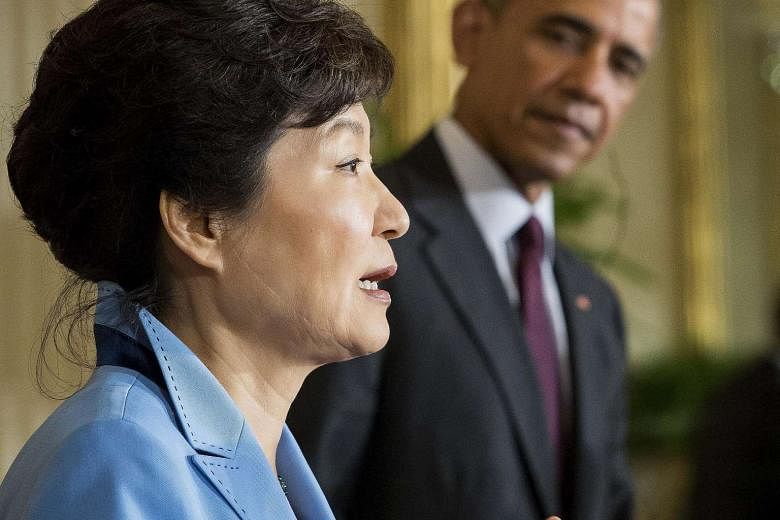United States President Barack Obama and South Korean President Park Geun Hye presented a united front against international cyber threats and the North Korean nuclear threat as the two countries reaffirmed ties, dismissing speculation of cracks in the relationship due to South Korea's overtures to China.
Speaking at a joint press conference at the White House on Friday, Mr Obama said "the alliance is on firmer footing than it has ever been", calling it a "linchpin of peace and security" on the Korean Peninsula and across the region.
Ms Park added that the two sides would "open new frontiers of cooperation" in health security, cyber security and space exploration.
A hotline will also be established between the White House and South Korea's Blue House for closer cooperation on cyber issues.
This show of unity is particularly significant as both countries navigate the changing balance of power in North-east Asia at a time when China is seeking greater influence in the region.
Ms Park, in particular, has pursued closer ties with her Chinese counterpart, Mr Xi Jinping, whom she has met six times since taking office in 2013. Last month, she raised a few eyebrows in the US when she attended China's World War II military parade.
But Mr Obama dismissed the notion that Ms Park's meetings with Mr Xi "must cause a problem" for the US. "We want South Korea to have a strong relationship with China, just as we want to have a strong relationship with China," he said, adding there was "no contradiction" between Seoul having good ties with the US and with China.
However, Mr Obama added that the US would continue to insist on a China that abides by international norms and rules. "And where they fail to do so, we expect the Republic of Korea to speak out on that, just as we do," he said.
On the issue of North Korea, both leaders once again expressed their commitment to the common goal of the denuclearisation of North Korea in a peaceful manner.
Ms Park, for her part, said her message to leaders when she last visited China was that "concerted efforts" were needed to resolve the North Korean nuclear threat. Given that US-led "six-party" talks to stop North Korea's nuclear ambitions have effectively stalled since 2008, Ms Park is hoping to gain support for another initiative involving the original parties, namely North and South Korea, the US, Japan, China and Russia, and Mongolia, which has gained deeper trust of both Koreas and increasingly has the potential to be a non-nuclear peace broker in the region.
This North-east Asia Peace and Cooperation Initiative is seen by Seoul as a way to keep diplomatic channels open with Pyongyang, while promoting better ties in the region. Ms Park is also hoping to capitalise on her warm ties with China - Pyongyang's biggest benefactor - to get Beijing to back the initiative.
While experts believe Ms Park's trip has done enough to allay any US concerns about Seoul's growing ties with China, the test of the relationship will come when South Korea has to pick a side in the event of international disagreements on issues such as the freedom of navigation in the South China Sea.
"Will Seoul stand up clearly in support of international law on these issue? I think it will, though it might not be the loudest protester in the room," said Mr James Schoff, senior associate of the Asia Programme at think tank Carnegie Endowment for International Peace. "If we see problems in alliance harmony in these issues in the future, then we know that this summit was not as successful as it should or could have been."

